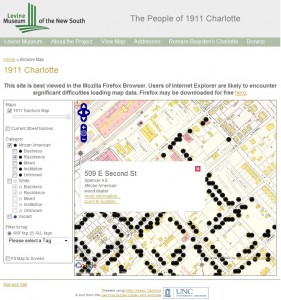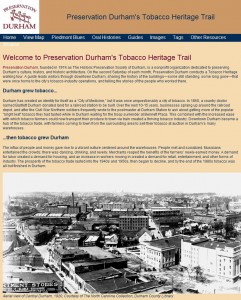Developed and operated in collaboration with UNC Library’s Carolina Digital Library and Archives, Main Street, Carolina is a public digital history program that enlists public libraries, museums, historic preservation  organizations, local governments, downtown redevelopment commissions, and other community groups across North Carolina in the creation of online projects that recover the histories of local neighborhoods. Main Street, Carolina was awarded the C. Felix Harvey Award to Advance Institutional Priorities at UNC-Chapel Hill in 2009 and was supported by a Digital Start-Up Grant from the National Endowment for the Humanities.
organizations, local governments, downtown redevelopment commissions, and other community groups across North Carolina in the creation of online projects that recover the histories of local neighborhoods. Main Street, Carolina was awarded the C. Felix Harvey Award to Advance Institutional Priorities at UNC-Chapel Hill in 2009 and was supported by a Digital Start-Up Grant from the National Endowment for the Humanities.
The projects use the Main Street, Carolina software platform, which facilitates the creation of digital content about people and places from the past and its visualization on historical maps. The software is designed to be used collaboratively and does not require prior technical training or web design experience.
Main Street, Carolina makes use of an innovative system for manipulating and displaying the North Carolina Collection‘s archive of Sanborn Fire Insurance Maps, widely regarded as the most important map source for documenting the history of urban space in the United States. This system takes advantage of historical mapping techniques developed for Going to the Show, a digital history resource documenting the history of moviegoing in North Carolina. Awarded the 2011 American Historical Association’s Rosenzweig Prize for Innovation in Digital History, Going to the Show is a collaboration between the Digital Innovation Lab’s Co-Director, Robert Allen, and UNC Library’s Documenting the American South.
 Programmatically, Main Street, Carolina is designed to amplify the capacity of cultural heritage organizations to create, implement, and sustain digital history and community engagement projects through partnerships with the University. The Lab works with community groups to develop project ideas, identify data sources, and scale project goals. Most Main Street, Carolina projects have been implemented through our annual graduate seminar on digital humanities/digital history, with students from the School for Information and Library Science, History, City and Regional Planning, and other fields working in collaborative teams with the community partners to execute them. The projects and the Main Street, Carolina software are hosted by UNC Library. The Lab Manager serves as project manager and works with partner organizations to launch and promote their projects (accessible from the partner’s own website). Partners retain administrative access to the projects, so that they can be updated and expanded. Undergraduate students in our associated Main Street, Carolina course on the history of urban spaces in North Carolina (AMST 350) have also contributed to projects and test the potential of completed projects to serve as teaching and discovery tools.
Programmatically, Main Street, Carolina is designed to amplify the capacity of cultural heritage organizations to create, implement, and sustain digital history and community engagement projects through partnerships with the University. The Lab works with community groups to develop project ideas, identify data sources, and scale project goals. Most Main Street, Carolina projects have been implemented through our annual graduate seminar on digital humanities/digital history, with students from the School for Information and Library Science, History, City and Regional Planning, and other fields working in collaborative teams with the community partners to execute them. The projects and the Main Street, Carolina software are hosted by UNC Library. The Lab Manager serves as project manager and works with partner organizations to launch and promote their projects (accessible from the partner’s own website). Partners retain administrative access to the projects, so that they can be updated and expanded. Undergraduate students in our associated Main Street, Carolina course on the history of urban spaces in North Carolina (AMST 350) have also contributed to projects and test the potential of completed projects to serve as teaching and discovery tools.
The UNC Library’s Main Street, Carolina site links to the eight projects launched thus far with notes on their goals and backgrounds.
